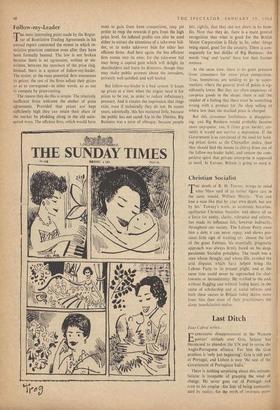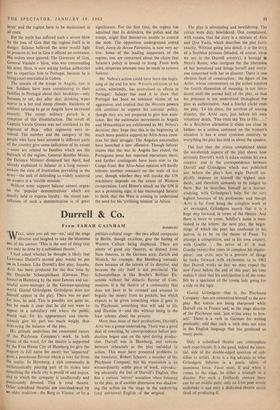Last Ditch
Joao Cabral writes :
EXPRESSING disappointment at the Western powers' attitude over Goa, Salazar has threatened to abandon the UN and to revise. the Anglo-Portuguese alliance. For him the Goa problem is 'only just beginning'; Goa is still part of Portugal, and Lisbon is now 'the scat of the Government of Portuguese India.'
There is nothing surprising about this attitude. Salazar is incapable of grasping the wind of change. He never goes out of Portugal----not even to his empire—for fear of being contamin- ated by reality; for the myth of 'Overseas prov- inces' and the regime have to be maintained at all costs.
But the myth has suffered such a severe blow by the loss of Goa that the regime itself is in danger. Salazar believed the army would fight to preserve it; but in Goa it offered no resistance. His orders were ignored. The Governor of Goa, General Vassalo e Silva, who was commanding his army there, is now asking Indian authorities not to repatriate him to Portugal, because he is being court-martialled in Lisbon.
The morale of the troops in Angola, too, is low. Soldiers have been complaining to their families in Portugal about their hardships—only bananas to eat, day after day; drinking water scarce in a hot and damp climate. Incidents of soldiers refusing to go to Angola have increased recently. The recent military putsch is a symptom of this dissatisfaction. The revolt of Captain Varela Gomes was not restricted to the regiment of Beja: other regiments were in- volved. The number and the category of the people who have been arrested in different parts of the country give some indication of its extent —some are related to families which are the bulwark of the regime. General Botelho Moniz, the Defence Minister dismissed last April, had already explained to Salazar in a long memor- andum the state of frustration prevailing in the army—the task of defending so widely scattered an empire is a 'suicide mission.'
Without army support Salazar cannot organ- ise the 'popular demonstrations' which are usually held to express loyalty : the recent can- cellation of such a demonstration is of great significance. For the first time, the regime has admitted that its defenders, the police and the troops, might find themselves unable to control the mob. The opposition underground united front, Junta da Accao Patriotica, is now very ac- tive. Some of the leading supporters of the regime, too, are concerned about the chaos that Salazar's policy is bound to bring. From both sides, desperate attempts may be made to remove Salazar.
Mr. Nehru's action could have been the begin- ning of the end for him Western criticism of his action, admittedly, has neutralised its effects in Portugal: Salazar has used it to show that Portugal has been an innocent victim of an aggression, and implied that the Western powers still continue to support his colonial policy, though they are not prepared to give him assis- tance. But the nationalist movements in Angola and Mozambique are exhilarated by Mr. Nehru's decision; they hope that this is the beginning of much more positive support by Afro-Asian coun- tries for their struggle. The Angolan nationalists have launched a new offensive. Though Salazar claims that the war in Angola has ended, the Portuguese press has reported operations there, and further contingents have been sent to the Congo front. But Afro-Asian opinion will hardly tolerate another massacre on the scale of last year, though whether they will invoke the UN machinery depends on the extent of Western co-operation. Lord Home's attack on the UN is not a promising sign; it has encouraged Salazar to think that the West is coming to understand the need for his 'civilising mission' in Africa.



































 Previous page
Previous page